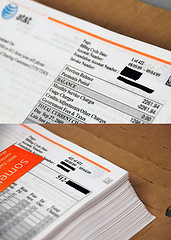FCC Approves Anti-Cramming Rules For Landlines, But Nothing Yet On Wireless
It’s been almost a year since the FCC finally got around to considering rule changes to keep landline phone service providers from padding customers’ bills with charges for third-party services that range from long-distance service to yoga classes. Today, the commission announced some new regulations — but they only goes so far in protecting consumers.
The new FCC rules require telephone companies to notify subscribers — at the point of sale, on each bill, and on their websites — if they have the option to block third-party charges from their landline telephone bills.
Additionally, the rules bolster the FCC requirement that third-party charges must be listed separately from the landline provider’s charges on phone bills.
But the FCC did not require phone companies to give customers the option of blocking third-party billing.
Even more noticeable is the lack of any FCC action whatsoever on bill-cramming on consumers’ wireless bills. Granted, reports show that bill-cramming is much more prevalent in landline billing, but the number of Americans with wireless service is only growing while residential landline service is not, so any delay on enacting wireless regulations is just allowing a growing problem to fester.
“Any step taken to expand consumer protections against cramming is a welcome one. However, more consumers are moving away from landlines towards wireless and VoIP services that aren’t guaranteed the same protections to combat unauthorized third party billing,” said Parul P. Desai, policy counsel for Consumers Union. “The same cramming abuses that happen on landlines can easily happen to wireless and VoIP customers. In order to crack down on these unauthorized charges, the FCC needs to consider stronger protections that apply to wireless.”
Want more consumer news? Visit our parent organization, Consumer Reports, for the latest on scams, recalls, and other consumer issues.


